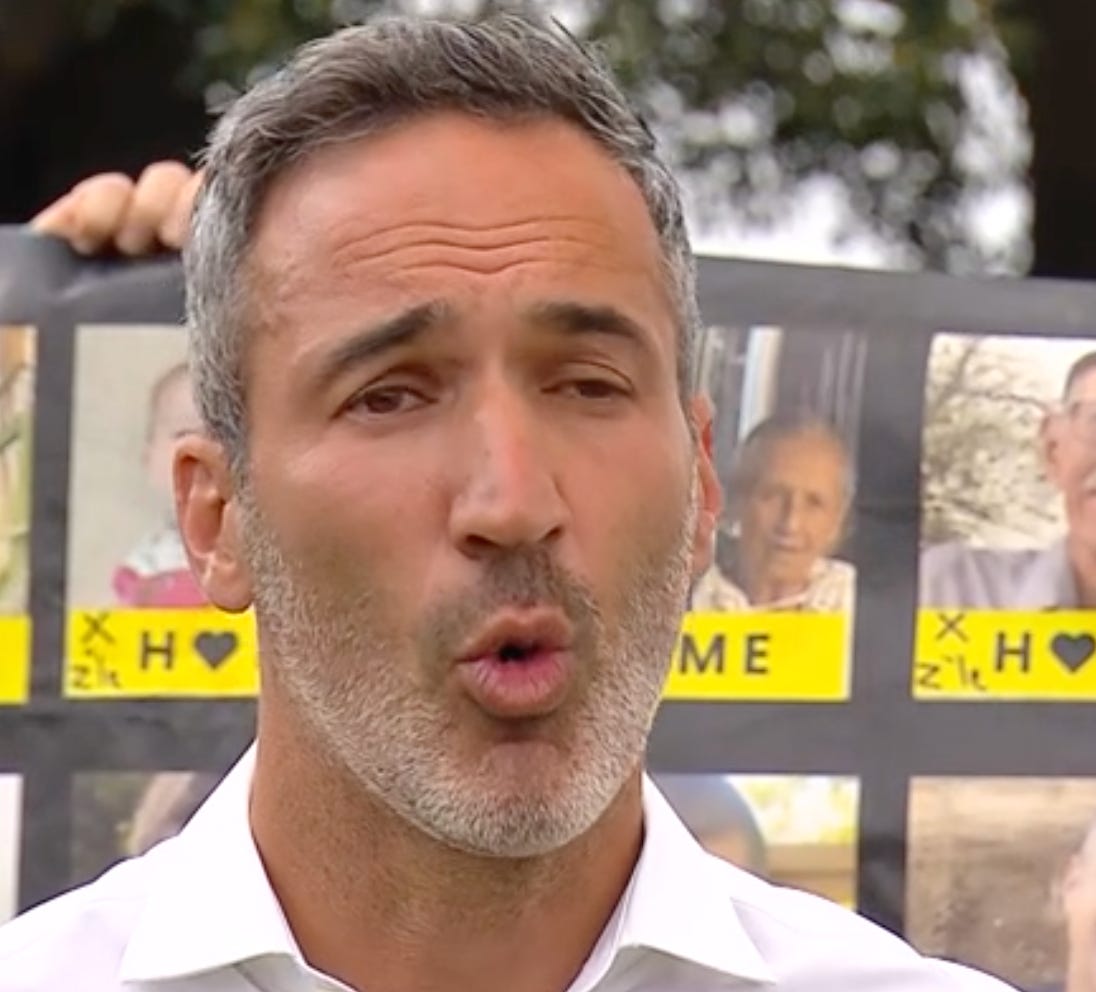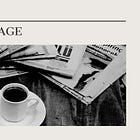Jewish Leader Says 48 Hostages Still Captive Two Years After 251 Kidnapped in Hamas Attacks
This piece is freely available to read. Become a paid subscriber today and help keep Mencari News financially afloat so that we can continue to pay our writers for their insight and expertise.
Today’s Article is brought to you by Empower your podcasting vision with a suite of creative solutions at your fingertips.
Executive Council of Australian Jewry co-CEO condemns Opera House protest plans as anti-Semitism surges, cites social media disinformation and historic slurs fueling “shredded social cohesion”
Forty-eight hostages remain captive in Gaza two years after Hamas kidnapped 251 people from Israel on October 7, 2023, according to Alex Ryvchin, co-CEO of the Executive Council of Australian Jewry, who marked the anniversary today by condemning planned Sydney Opera House protests and linking surging anti-Semitism to social media disinformation.
“Today, 48 hostages still remain captive,” Ryvchin said at a media address, describing the ongoing crisis as “a fight for the soul of humanity.”
The 251 people kidnapped two years ago included “babies, children, the elderly, women and men” taken into Gaza by Hamas, Ryvchin said, emphasizing that families continue living in anguish awaiting their return.
“While we will never forget nor forgive what Hamas did on this day two years ago and what it continues to do, we live in hope that the hostages will soon be free, that the anguish of the families will soon end and they can all begin to heal,” Ryvchin said.
Truth matters. Quality journalism costs.
Your subscription to Mencari directly funds the investigative reporting our democracy needs. For less than a coffee per week, you enable our journalists to uncover stories that powerful interests would rather keep hidden. There is no corporate influence involved. No compromises. Just honest journalism when we need it most.
Not ready to be paid subscribe, but appreciate the newsletter ? Grab us a beer or snag the exclusive ad spot at the top of next week's newsletter.
Opera House Protest Opposition
Ryvchin expressed strong opposition to the Palestinian Action Group’s planned weekend protest at Sydney Opera House, which New South Wales Police are challenging in Supreme Court today on crowd safety grounds.
“We’ve seen for two years what these protests are about. We’ve made our objections known for a long time,” Ryvchin said. “We support the right of peaceful protest, but every right has its bounds. And I think that’s been thoroughly tested by these activists, both through the tone and terror of these protests, the cost to the public, and the fact that they’ve been done over and over again.”
He contrasted the activist protests with what he described as dignified demonstrations by women standing vigil for hostages.
“I think these women with their protests have shown the contrast. They have been there to stand up for a cause they believe in, in a quiet and dignified fashion, at no public expense. They don’t incite violence. They don’t support terrorism. They are an exemplar,” Ryvchin said.
National Security and Social Cohesion
Ryvchin characterized two years of weekly protests as damaging Australia’s social fabric and security environment.
“I think that the way that these protesters have been behaving for two years, we see the dividends of that in terms of anti-Semitism, in terms of the failures of national security, shredded social cohesion,” he said. “And there comes a point where we as a country have to put an end to this.”
The comments align with earlier statements today from Ben Carlill, Australia, Israel and Jewish Affairs Council Director of Special Projects, who told Sky News the past two years will take “a generation to heal” and accused the Albanese government of “aggressively distancing itself from Israel and indeed from the Australian Jewish community.”
Independent MP Allegra Spender, representing Wentworth with Australia’s highest Jewish population, separately told Sky News constituents “question whether they are still welcome here” after experiencing “the biggest rise in anti-Semitism that the Australian Jewish community has ever seen.”
Anti-Semitism Triggers
When asked why anti-Semitism has surged over the past two years, Ryvchin offered a historical framework for understanding the phenomenon.
“Anti-Semitism is something that is always there. It’s always dormant in a society and it needs a trigger. Whether it be an economic downturn, revolution or war, it allows people to manipulate the masses and to show them, to try to convince them that all the problems of society are the fault of the Jew,” Ryvchin said.
He pointed to social media as amplifying traditional anti-Semitic tropes.
“We’ve seen something extraordinary arise with social media disinformation, with many in the public sphere that have traded in old historic slurs about the Jewish people, about being bloodthirsty killers, about seeking to control all of society, and they found fertile ground for that,” Ryvchin said.
Australian Support
Despite the challenges, Ryvchin expressed pride in Australian responses to the Jewish community’s circumstances.
“I’ve never been more proud to be an Australian or to represent a community that embodies love of this country, positive contribution and courage under fire,” Ryvchin said, referencing “thousands upon thousands who have contacted us in their humble words and their humble gestures of support and solidarity for our community.”
His comments came during a media address featuring women standing for hostages, providing visual contrast to his descriptions of activist protests.
October 7 Context
The October 7, 2023 Hamas attacks killed over 1,200 people in Israel, marking what Spender earlier described as “the single biggest loss of life since the Holocaust” for Jewish Israelis.
Prime Minister Anthony Albanese is scheduled to deliver a parliamentary statement today marking the anniversary, with Opposition Leader Sussan Ley invited to participate.
Albanese said yesterday that October 7 “is the two year anniversary of the greatest number of murders of Jewish people since the Holocaust” and warned demonstrations on the anniversary “will not advance” the Palestinian cause but “will set it back in terms of support here in Australia.”
Supreme Court Battle
The Palestinian Action Group appeared at Sydney’s Supreme Court today seeking permission to proceed with their planned October 12 protest at Sydney Opera House, after NSW Police filed an objection yesterday citing concerns about crowd crush with 10,000 expected attendees.
Assistant Commissioner Peter McKenna said the Opera House forecourt cannot safely accommodate the numbers indicated in the protest application, with the venue surrounded by water and having only narrow exit points for emergency evacuation.
“It’s about public safety,” McKenna said yesterday, noting the Opera House has “development approval and engineering requirements, which says that they cannot facilitate the amount of people that the Form 1 has indicated are likely to attend.”
Police offered alternate routes the Palestinian Action Group could use, with McKenna expressing hope for negotiated resolution.
Ryvchin’s opposition to the Opera House location reflects broader Jewish community concerns about protests at iconic landmarks during sensitive periods.
Peace Deal Progress
Several speakers today referenced President Donald Trump’s 20-point Gaza peace framework currently under Hamas consideration as offering potential resolution to the conflict.
Spender noted the timing irony: “The great irony is that there’s a peace deal that Israel has agreed to. We haven’t been this close to peace or some kind of form of peace in Gaza for the best part of two years. And it just shows that these protesters will protest, I think, no matter what.”
Carlill praised the plan’s conditional structure, calling it “achievement dependent” rather than “time dependent,” linking Palestinian progress toward statehood with achieving specific security and governance objectives.
“What this shows is that finally the international community, as well as two of Hamas’s three main sponsors, Qatar and Turkey, are saying, look, Hamas’s role in Gaza as a ruler of Gaza is finished. We need to move on,” Carlill said.
Community Trauma
Ryvchin’s emphasis on remaining “a hopeful people” despite trauma reflects themes expressed by other Jewish community representatives today.
Carlill earlier told Sky News: “It has been a terrible two years for the Australian Jewish community. Obviously, the trauma of October 7, a trauma that still isn’t over because not all the hostages are home yet.”
He cited multiple sources of community distress beyond the October 7 attacks themselves: “We’ve had this surge of anti-Semitism in Australia over the past two years. We’ve had people and groups in Australia that the Jewish community thought would have their backs, have actually turned their backs to the Jewish community.”
Spender described constituent experiences with anti-Semitic incidents in Wentworth itself: “The horrific anti-Semitism attacks that I’ve seen in my own electorate, those are the sorts of things that just don’t belong in our country, in whatever your views on conflicts overseas.”
Protest Rights vs. Limits
Ryvchin’s formulation that “every right has its bounds” captures tensions between freedom of assembly and community concerns about protest impacts.
His specific criticisms targeted activist protest methods rather than denying the right to demonstrate: “the tone and terror of these protests, the cost to the public, and the fact that they’ve been done over and over again.”
The contrast he drew with hostage family vigils emphasized peaceful, low-cost demonstrations that “don’t incite violence” and “don’t support terrorism” as acceptable models for exercising protest rights.
NSW Premier Chris Minns has described the Opera House protest plans as “hugely insensitive” and “tone deaf,” though Spender noted the Premier “has many more levers at his disposal in relation to the protests because they are state issues” compared to federal authorities.
Two-Year Mark
The second anniversary of October 7 arrives as Jewish community representatives describe profound domestic impacts extending beyond the Middle East conflict itself.
Ryvchin’s reference to “failures of national security” and “shredded social cohesion” as consequences of two years of protests suggests community leaders view the domestic response as a distinct problem requiring Australian solutions.
His statement that “there comes a point where we as a country have to put an end to this” frames the issue as one of Australian national values rather than solely about overseas conflict positioning.
The 48 hostages remaining in captivity after 251 were initially taken represents an ongoing crisis that Ryvchin emphasized prevents closure for affected families and communities.
“We live in hope that the hostages will soon be free, that the anguish of the families will soon end and they can all begin to heal,” he said, linking hostage returns to community healing prospects.
Social Media Role
Ryvchin’s emphasis on social media disinformation as amplifying anti-Semitism highlights technological dimensions of the past two years’ developments.
His description of “many in the public sphere that have traded in old historic slurs about the Jewish people” suggests concern about mainstream figures, not just fringe actors, promoting anti-Semitic narratives.
The characterization of these narratives finding “fertile ground” indicates community leaders view the current environment as particularly receptive to anti-Semitic messaging.
Ryvchin positioned current anti-Semitism within historical patterns of Jewish communities facing persecution during times of crisis.
“Whether it be an economic downturn, revolution or war, it allows people to manipulate the masses and to show them, to try to convince them that all the problems of society are the fault of the Jew,” he said, framing anti-Semitism as a recurring phenomenon across different triggering events.
The analysis suggests community leaders view October 7 and the subsequent Gaza conflict as triggering latent anti-Semitic sentiment rather than creating it from nothing.
Australian Identity
Despite challenges, Ryvchin expressed strong identification with Australia and pride in the Jewish community’s relationship with the broader nation.
“I’ve never been more proud to be an Australian or to represent a community that embodies love of this country, positive contribution and courage under fire,” he said.
The emphasis on “thousands upon thousands” offering support suggests community leaders distinguish between activist protesters and broader Australian public sentiment.
His statement captures the complex position of Jewish Australians marking a traumatic anniversary while navigating domestic tensions around the conflict and experiencing what multiple speakers described as unprecedented anti-Semitism.
The 48 hostages still captive serve as a constant reminder that the October 7 crisis continues with no resolution, making healing difficult even as peace negotiations potentially advance through Trump’s framework proposal.
Sustaining Mencari Requires Your Support
Independent journalism costs money. Help us continue delivering in-depth investigations and unfiltered commentary on the world's real stories. Your financial contribution enables thorough investigative work and thoughtful analysis, all supported by a dedicated community committed to accuracy and transparency.
Subscribe today to unlock our full archive of investigative reporting and fearless analysis. Subscribing to independent media outlets represents more than just information consumption—it embodies a commitment to factual reporting.
As well as knowing you’re keeping Mencari (Australia) alive, you’ll also get:
Get breaking news AS IT HAPPENS - Gain instant access to our real-time coverage and analysis when major stories break, keeping you ahead of the curve
Unlock our COMPLETE content library - Enjoy unlimited access to every newsletter, podcast episode, and exclusive archive—all seamlessly available in your favorite podcast apps.
Join the conversation that matters - Be part of our vibrant community with full commenting privileges on all content, directly supporting The Evening Post (Australia)
Catch up on some of Mencari’s recent stories:
It only takes a minute to help us investigate fearlessly and expose lies and wrongdoing to hold power accountable. Thanks!








